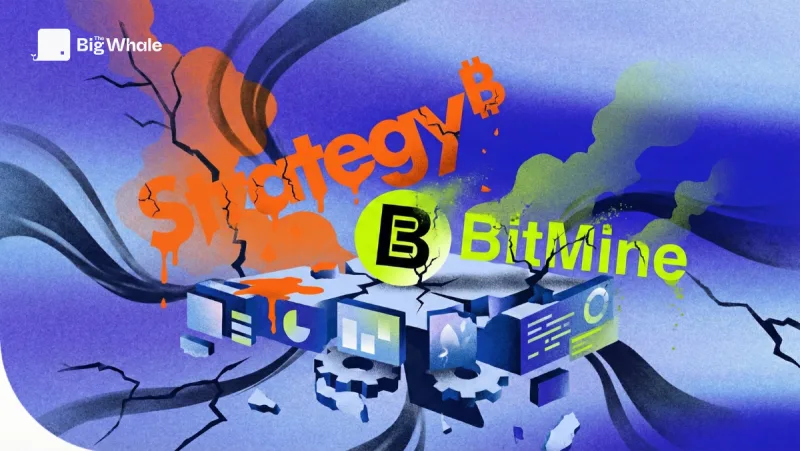TBW - Rand Hindi (Zama): "Confidentiality is the missing key to mass adoption of institutional services".
"Confidentiality is the missing key to mass adoption of institutional services".

You are one of the most vocal campaigners for the confidentiality of transactions on blockchains. Why?
Because businesses are increasingly active in the onchain economy and this is a crucial point for them. The subject of confidentiality is important for individuals, but it is at least as important, if not more so, for businesses. Without it, they can't do business.
How is Zama progressing on this subject of transaction confidentiality?
At first, we were selling our tech to other companies in the sector. But we realised that the majority of projects wanted to build applications directly on public blockchains like Ethereum, Solana or Base. They didn't want to launch their own blockchain.
In this context, we thought it would be more interesting to create a protocol that could bring confidentiality on top of existing public blockchains.
What transactions today most need confidentiality?
Payments, very clearly. We're talking about the payment of an onchain salary or the payment of a contract. Whatever the case, we don't want the amounts to be public.
If tomorrow all payments go onchain via stablecoins, that will represent gigantic volumes. We're talking trillions of dollars.
Our aim is for Zama to be the confidentiality layer for these payment volumes. Even if only 10% of these payments go through Zama, we're already talking about hundreds of billions of dollars worth of transactions.
What are the other use cases beyond payment?
Tokenisation and asset trading. But there is no chance that large funds or institutions will want to display their positions. Finance is based on asymmetric information. If everything is public, this 'edge' disappears, and so nobody trades. Confidentiality is the missing key to massive institutional adoption.
There are several technologies to guarantee confidentiality. You have chosen FHE (Fully Homomorphic Encryption). Why did you make this choice, compared with ZKP (Zero-Knowledge Proof) or MPC (Multi-Party Computation)?
ZKP is great, but it can't be combined. You can't simply combine two proofs to make a transfer: you need a third element in the middle.
For its part, MPC works well, but it's not publicly verifiable, so you have to trust the people doing the calculations.
FHE, on the other hand, is composable, publicly verifiable, and post-quantum. Calculations are performed on encrypted data, exactly as with a smart contract. Historically, the only problem with FHE was performance. But we have made enormous progress.
That is?
In other words, the Zama protocol can saturate Ethereum. We're beyond its capacity. By the end of the year, we'll be at the level of a good layer 2, i.e. around 100 transactions per second (TPS).
In a year's time, we'll be at 1,000 TPS. That's what's needed for payment. Especially as payments are often independent and parallelisable. If you want to add 1,000 payments in parallel, all you have to do is add servers.
And in terms of costs? A system like this must be pretty expensive...
Paradoxically, no. In fact, Zama doesn't charge for the compute, but for encrypting and decrypting transactions.
On Ethereum, we're around 11 cents per payment. On Base, we go below 2 cents. Frankly, it costs next to nothing.
How does the Zama system work?
It's a two-stage system. First, people "buy confidential tokens on the blockchain", a bit like stablecoins. Then, they can use these confidential tokens to pay or deposit them in a DeFi protocol.
We are working on solutions that allow confidential tokens to be used on non-confidential DeFi protocols. For example, being able to swap a confidential USDC for a confidential ETH on Uniswap without creating new liquidity. This is a good first step to accelerate adoption.
Tokenisation is one of the big topics of the moment. What topics are you looking at most in this area?
There are many. One subject that interests me is onchain credit. It's a subject that speaks to everyone.
Today, you can't really do onchain credit, because if someone doesn't repay, you have no recourse.
What's interesting is that with Zama and the FHE, you can encrypt the borrower's identity, select it according to a few criteria (income, nationality...), store it in a smart contract, and only reveal it in the event of default. This means that we can lend to people without knowing their identity, while ensuring that they meet the criteria we have set.
How does this system work in practice?
The borrower provides his information and proves via Zama that he meets the criteria. If they stop repaying, the lender can decipher their identity.
We have started discussing this with certain lending protocols such as Morpho. We're convinced that what we saw with messaging apps is going to happen with crypto: at first, no one wanted a privacy-based app, and now it's a rush.
What's the current status of Zama? You launched the testnet at the beginning of July.
Yes, and the results are in line with our expectations. Obviously, not everything is going according to plan, there are adjustments to be made, but overall everything is working. Between now and October, we want to stabilise the testnet and launch a first mainnet on Ethereum.
Then, in November, we'll go multichain: Base, BNB, Ethereum...
Will there be a token?
I can't confirm anything at this stage. We're focused on the testnet, that's the most important thing.
How many people work at Zama at the moment?
90 people, including 40 PhDs. And with the new round of funding we completed a few weeks ago, we're very well funded to move forward.
I'm confident: we've really cracked a big problem. For me, there will be no mass adoption of blockchain without confidentiality. Since the arrival of BlackRock in 2024 with its ETFs, things have been accelerating.
The traction is there, but there is still this major obstacle of confidentiality, which comes up regularly - and that is what we want to correct to enable even greater acceleration by companies.



